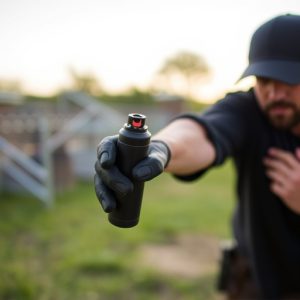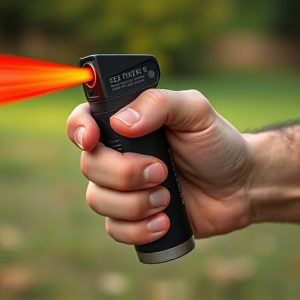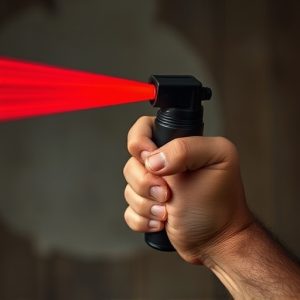Pepper Spray Defense: Legalities, Choice, & Ethical Considerations
Pepper spray, a popular self-defense tool, varies in legality and effectiveness across U.S. states……..
Pepper spray, a popular self-defense tool, varies in legality and effectiveness across U.S. states. Understanding local Pepper Spray Laws by State is essential for safe and legal self-defense options. Regulations cover age restrictions, training requirements, permitted uses, and spray types. Factors like ease of use, range, durability, and potency guide selection. Responsible usage balances personal safety with respect for legal boundaries and minimizes collateral damage.
“Aerosol spray defense, particularly pepper spray, offers individuals a powerful tool for self-protection against attackers. With varying legal frameworks across states, understanding the active ingredients, effectiveness, and unique laws is crucial. This article guides you through the intricacies of pepper spray, from its chemical composition to choosing the right device and training for safe use. We’ll also explore potential risks and ethical considerations, ensuring informed decisions in navigating Pepper Spray Laws by State.”
- Understanding Pepper Spray: Active Ingredients and Effectiveness
- Legal Framework: Pepper Spray Laws by State and Their Variations
- Choosing the Right Spray: Factors to Consider for Personal Defense
- Effective Use and Training: Ensuring Safety and Compliance
- Potential Risks and Ethical Considerations in Self-Defense with Aerosol Sprays
Understanding Pepper Spray: Active Ingredients and Effectiveness
Pepper spray, a common self-defense tool, is designed to incapacitate an attacker temporarily, allowing users to escape or summon help. The active ingredient in pepper spray is capsaicin, a compound derived from chili peppers. Capsaicin irritates the eyes, nose, and respiratory system by binding to specific receptors, leading to painful sensations and temporary blindness. This disruption can give users precious time to react and defend themselves against physical harm.
The effectiveness of pepper spray depends on various factors, including the concentration of capsaicin, the distance between the user and attacker, and environmental conditions like wind. Different states in the US have varying Pepper Spray Laws, regulating its possession, use, and accessibility. Understanding these laws is crucial for individuals considering self-defense options, as it ensures compliance with local regulations and promotes safety in public spaces.
Legal Framework: Pepper Spray Laws by State and Their Variations
In the United States, the legal framework surrounding pepper spray, or oleoresin capsicum (OC) spray, varies significantly from state to state. While federal law does not explicitly regulate the civilian use of pepper spray, individual states have enacted their own laws, regulations, and restrictions. Understanding these Pepper Spray Laws by State is crucial for those considering carrying OC spray for self-defense.
Each state has different requirements regarding age restrictions, training mandates, and permitted uses. Some states, like Texas and Florida, allow citizens to carry pepper spray without a permit while others, such as California and New York, require permits or licenses. Additionally, there are variations in the types of pepper spray legal for civilian use, with some states limiting strengths and sizes. These Pepper Spray Laws by State not only impact personal safety but also reflect societal attitudes towards self-defense and law enforcement intervention.
Choosing the Right Spray: Factors to Consider for Personal Defense
When selecting an aerosol spray for personal defense, understanding local Pepper Spray Laws by State is paramount. Different regions have varying regulations regarding the type, strength, and legality of bear spray, pepper spray, or other similar self-defense products. It’s crucial to research and comply with these laws to avoid legal repercussions.
Several factors influence the choice of the right spray. Consider factors such as ease of use, range and distance coverage, durability, and active ingredient potency. For instance, pepper spray is a common choice due to its high effectiveness in causing temporary blindness and disorientation in attackers. However, some prefer bear spray, which uses capsicum methyl ester and is potent against larger animals too. Understanding your specific needs, environment, and legal framework will guide you in making an informed decision.
Effective Use and Training: Ensuring Safety and Compliance
The effective use of aerosol spray, like pepper spray, for self-defense requires proper training and a deep understanding of local regulations. Beyond ensuring personal safety, it’s crucial to navigate the varying Pepper Spray Laws by State to stay compliant. Every state has its own set of rules regarding who can possess and carry these defensive tools, where they can be used, and under what circumstances.
Training sessions should cover not just the physical application of the spray but also de-escalation techniques and legal considerations. This includes recognizing potential threats, understanding trigger safety, and learning how to effectively deploy the spray while minimizing collateral damage. Adhering to these guidelines not only ensures personal safety but also helps prevent unnecessary legal repercussions.
Potential Risks and Ethical Considerations in Self-Defense with Aerosol Sprays
While aerosol sprays, commonly known as pepper spray, offer a powerful tool for self-defense against attackers, their use isn’t without potential risks and ethical considerations. One significant concern is the impact on bystanders or individuals with pre-existing health conditions. Pepper spray can cause temporary blindness, difficulty breathing, and severe pain, making it crucial to use only when absolutely necessary. The intensity of these effects can vary based on factors like proximity to the attacker and environmental conditions.
Moreover, legal implications add another layer to the discussion around aerosol sprays. Each state has its own Pepper Spray Laws by State dictating when and where pepper spray can be legally carried and used. Unlawful use or possession can lead to severe penalties. It’s essential for individuals considering self-defense measures with aerosol sprays to understand these laws thoroughly and act responsibly, ensuring their safety and that of others around them.
In conclusion, while pepper spray offers a powerful personal defense option, understanding the complexities of its legal framework, active ingredients, and potential risks is paramount. Navigating the varying Pepper Spray Laws by State ensures responsible use and compliance. Choosing the right spray, coupled with proper training in effective use, can significantly enhance safety without crossing ethical boundaries in self-defense scenarios.


